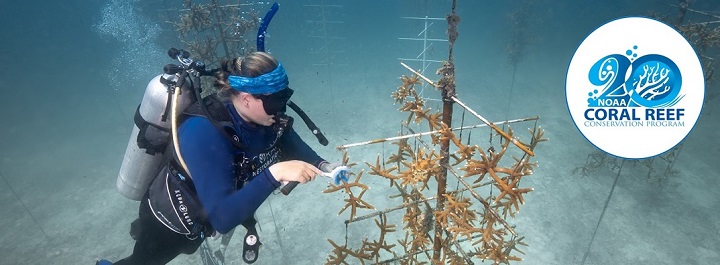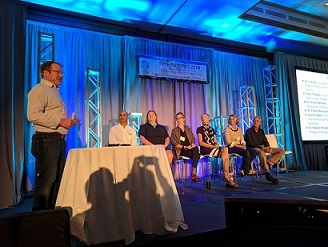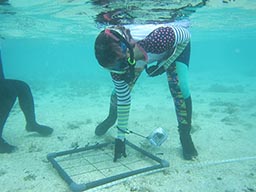- ABOUT US
- PROGRAM AREAS
- CONSERVATION APPROACH
- EDUCATION
- MULTIMEDIA
Coral Heroes: The Coral Restoration Consortium
Throughout the Coral Reef Conservation Program’s 20th Anniversary, we are highlighting Coral Heroes — individuals and organizations who have worked with the program and are making a real difference in coral reef conservation.

Addressing coral stressors, such as unsustainable fishing practices, land-based sources of pollution, and climate change, is critical to conserving coral reef ecosystems. Yet corals are succumbing faster than they can recover. The coral community is turning to active restoration to provide reefs with time to recuperate and become more resilient.
The Coral Restoration Consortium is an international community of practice that includes scientists, managers, coral restoration practitioners, and educators. The consortium’s mission is to support collaboration and technology transfer, and to facilitate scientific and practical innovation. The Coral Restoration Consortium aims to increase the scale and efficiency of coral restoration through activities that include scaling up in-water, land-based, and larval breeding; the generation of restoration monitoring guidelines and common-access data platforms; and the coordination and fostering of genetics science into adaptive restoration.
“It's all hands on deck right now for tropical corals. If climate change can be tempered and eventually reversed, while local environmental conditions are optimized, corals and the reefs they build may be able to persist through the end of the century in certain areas with the help of human-assisted restoration,” notes Tali Vardi, coral science lead with NOAA’s Office of Science and Technology and executive coordinator of the Coral Restoration Consortium. “Over the past three years, the Coral Restoration Consortium has developed from a few Caribbean experts to a global body of restoration scientists, managers, and practitioners — sharing successes and failures, developing best management guidelines, and collaborating on cutting-edge science.”

In 2018, the Coral Restoration Consortium took a new step toward its mission by hosting Reef Futures, the first truly international conference on coral reef restoration.
“As the community of coral restoration practitioners continued to grow exponentially, it became clear we needed a dedicated venue where advancing the science and practice of restoration could take center stage,” says Tom Moore, NOAA coral reef restoration team lead and co-chair of the Coral Restoration Consortium. “This was the genesis of the first ever Reef Futures conference, where over 550 participants came together for a week of sharing the latest science and advancements in the field of restoration.” Topics discussed included spawning, monitoring, community engagement, and stony coral tissue loss disease.
We look forward to continuing our partnership with the Coral Restoration Consortium on activities, including the next Reef Futures conference in May 2021.
Follow the celebration on our Facebook and Twitter pages and the National Ocean Service Instagram page all year using the hashtag #NOAACoral20th.
Related Stories and Products
About Us

The NOAA Coral Reef Conservation Program was established in 2000 by the Coral Reef Conservation Act. Headquartered in Silver Spring, Maryland, the program is part of NOAA's Office for Coastal Management.

The Coral Reef Information System (CoRIS) is the program's information portal that provides access to NOAA coral reef data and products.
Work With US
U.S. Coral Reef Task Force
Funding Opportunities
Employment
Fellowship Program
Contracting Assistance
Graphic Identifier
Featured Stories Archive

Access the archive of featured stories here...
Feedback
Thank you for visiting NOAA’s Coral Reef Conservation Program online. Please take our website satisfaction survey. We welcome your ideas, comments, and feedback. Questions? Email coralreef@noaa.gov.
Stay Connected
Contact Us
NOAA’s Coral Reef Conservation Program
SSMC4, 10th Floor
1305 East West Highway
Silver Spring, MD 20910
coralreef@noaa.gov
